Comedy boomtime No joke: Laughs galore as performers from all backgrounds hit city stages with more venues than ever before
Read this article for free:
or
Already have an account? Log in here »
To continue reading, please subscribe:
Monthly Digital Subscription
$0 for the first 4 weeks*
- Enjoy unlimited reading on winnipegfreepress.com
- Read the E-Edition, our digital replica newspaper
- Access News Break, our award-winning app
- Play interactive puzzles
*No charge for 4 weeks then price increases to the regular rate of $19.00 plus GST every four weeks. Offer available to new and qualified returning subscribers only. Cancel any time.
Monthly Digital Subscription
$4.75/week*
- Enjoy unlimited reading on winnipegfreepress.com
- Read the E-Edition, our digital replica newspaper
- Access News Break, our award-winning app
- Play interactive puzzles
*Billed as $19 plus GST every four weeks. Cancel any time.
To continue reading, please subscribe:
Add Free Press access to your Brandon Sun subscription for only an additional
$1 for the first 4 weeks*
*Your next subscription payment will increase by $1.00 and you will be charged $16.99 plus GST for four weeks. After four weeks, your payment will increase to $23.99 plus GST every four weeks.
Read unlimited articles for free today:
or
Already have an account? Log in here »
Hey there, time traveller!
This article was published 28/04/2023 (957 days ago), so information in it may no longer be current.
It’s possible there’s never been a better time to be funny in Winnipeg.
New comedy nights and venues keep popping up in settings old and new, with open-mic nights and showcases featuring comics in all genres and of all ages and backgrounds.
Free Press arts and life writers talked to a cross-section of those involved in our city’s diverse comedy scene — from old-school orators to fresh-faced folks plying their jokes in both English and French, from the city’s Indigenous comedians to those playing host to this cavalcade of comics — to find out just what is tickling the city’s proverbial funny bone.
Adding to the abundance of local laughs is the return of the Winnipeg Comedy Festival, which starts Tuesday and runs through May 7. It seems Winnipeggers truly will, for once, get the last laugh.
THE VENUES
Wee Johnny’s, Kilter Brewing, Stone Angel Brewing Co., the Limelight, the Basement Speakeasy, 1928 Eatery & Pub, the Silver Heights Restaurant — these are just some of the many venues now playing host to local comics for standup, improv and open-mic events. But none truly heralded the recent rise of comedy in Winnipeg quite like the addition of a Canadian comedic institution — Yuk Yuk’s.
This is Yuk Yuk’s second foray into Winnipeg’s comedy scene, after a stint in Osborne Village in the late 1980s and early ’90s.
For longtime local comic Lara Rae, the club’s return to the city, in the Club Room of the Fort Garry Hotel, offered the 59-year-old the ideal chance to dive back into the world of standup.
JESSICA LEE / WINNIPEG FREE PRESS Longtime local comic Lara Rae returned to comedy when Yuk Yuk’s returned to Winnipeg in the Fort Garry Hotel’s Club Room.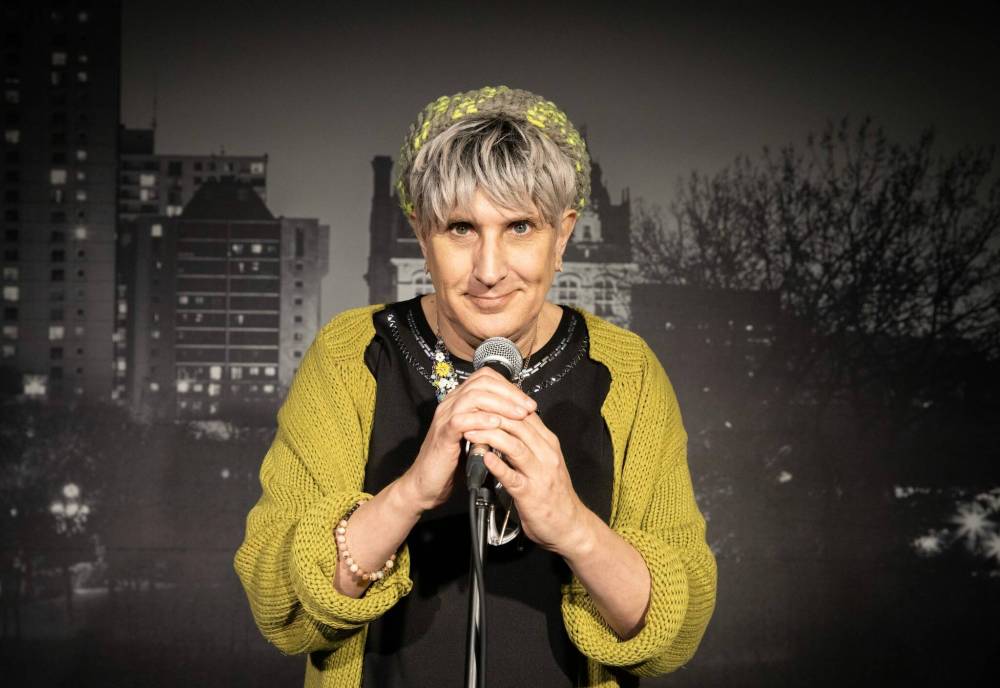
“When (Yuk Yuk’s co-founder) Mark Breslin was talking to Ida (Albo, owner of the Fort Garry Hotel), they both thought of me… I had left to do work in social services. But it just felt good.
“I started at Yuk Yuk’s when I was 18 years old… I’ve been around the rooms and performed at Yuk Yuk’s for the last 40 years.”
The club opened in early February, with well-known Canadian comic and TV personality Shaun Majumder headlining. “It’s just a perfect room to see comedy… there are no pillars, it has great sight lines,” Rae notes.
While Yuk Yuk’s doesn’t currently host open-mic nights — preferring to feature established local and national/international talent — Rae, who until 2019 was at the helm of the Winnipeg Comedy Festival, sees the value in comics cutting their teeth on the growing local amateur circuit.
Some of that value, however, comes from knowing how much is too much. “One of the things I’ve noticed is that people who really make leaps and bounds, improvements, are people that actually step away from the open mic week after week, show after show, and take some time off to write and develop, to go on the road,” she says.
Rae relishes the evolution of today’s comedy environment relative to when she started out.
JESSICA LEE / WINNIPEG FREE PRESS ‘It would be hard for a trans person to feel comfortable in the comedy room when I started,’ says Lara Rae, ‘let alone going onstage. The amount of diversity today, both in the audience and onstage, is a renaissance.’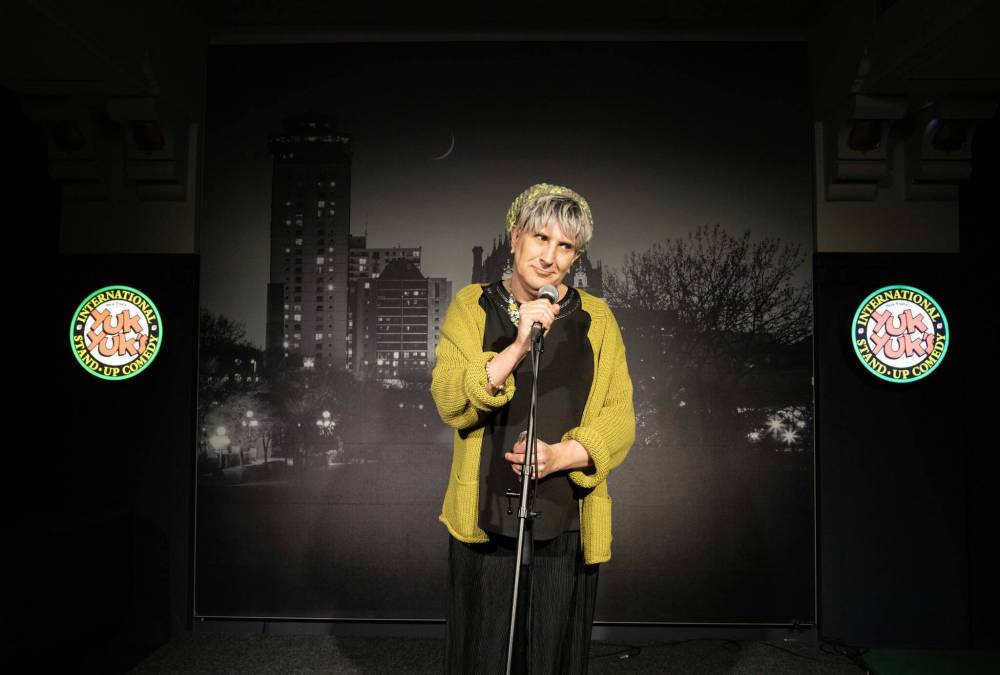
“As a trans person talking in the midst of an extremely stressful time, when it seems the world has never been more polarized… the progressiveness in the comedy rooms is extremely impressive,” she says. “It would be hard for a trans person to feel comfortable in the comedy room when I started, let alone going onstage. The amount of diversity today, both in the audience and onstage, is a renaissance.”
With her role quarterbacking the shows at Yuk Yuk’s, Rae has been able to help connect local comics with national and international performers. “We have a dressing room where every week, the local or the out-of-town MC, the local middle, the headliner and myself have incredibly engaging and dynamic conversations about comedy as an art form,” she says.
The return of Yuk Yuk’s has, so far, been a rousing success, with crowds continuing to grow. And the calibre of Winnipeg performers has not gone unnoticed.
“When Mark came out, he was incredibly impressed with the quality of the local comics,” Rae says, adding it has felt good to get back onstage with new material.
“I’d say I’m still a going concern,” she says, laughing.
Another recent addition to the local comedy landscape has come via the Silver Heights Restaurant on Portage Avenue in St. James.
Co-founded by comics Scott Porteous and Eric Parent, the weekly Sheights & Giggles night plays host to a showcase of local comics starting at 10 p.m. on Saturdays in the restaurant’s dining room.
“There weren’t enough shows going on for the amount of comedians that want stage time,” says Parent, 32, who has been involved in both onstage and behind-the-scenes aspects of comedy nights in the city. “I wanted to find a place where I could run a weekly show that would force me to work on new material every week.”
Parent and Porteous aim to bring in one bigger-name local act each week to get crowds in the door, while at the same time giving time to up-and-comers. “We’re sticking somebody that’s of headline quality to go and do 20 minutes, and then the other four or five comedians do 10 minutes each,” Parent says.
Since kicking off in early April, Sheights & Giggles night has proven very popular. “All the reviews we’ve gotten from people are that they’re happy, they’re loving it,” says Parent. “They’re happy there’s something like this now in their neighbourhood.”
“All the reviews we’ve gotten from people are that they’re happy, they’re loving it. They’re happy there’s something like this now in their neighbourhood.”–Eric Parent
Parent is also pleased as punch about the partnership with the Silver Heights Restaurant. “There are a million places, a million bars that I could set up a comedy night,” he says. “They’re the only people that seem to be willing to help — paying for radio advertisements, paying the comedians based per show rather than on ticket sales.”
As for the increase in comedy nights in the city, Parent isn’t sure there’s an uptick in the number of comedians so much as there is a desire for folks to test-drive their comedic chops post-COVID. “There’s always been this many comedians; I have a feeling it has something to do with the pandemic,” he says. “But there’s definitely a greater cross-section of voices.”
Parent took his own lessons away from the pandemic and its related shutdowns. “It forced me to deal with my mental health, my anxiety, my depression and face them head on,” he says. “That’s probably the one good thing that came out of the pandemic, and that forced me to start trying to make a lot more comedy… especially in an inclusive room.”
Overall, Parent calls putting together a weekly comedy night a dream come true. “It’s not an easy feat… but then you’re in charge, and trying to organize all these amazing energies and egos that come along with comedy.”
— Ben Sigurdson
INDIGENOUS LAUGHS
Indigenous comedy is so much more than just a punchline. For three rising comedians, it’s about community-building and the exchange of shared experiences in a joyous and welcoming space.
Taylor Paige, who has been performing standup for six months, recently established her own Indigenous comedy night, Bannock Bums, at Limelight on St. Mary’s Road.
She says the burgeoning interest in Indigenous comedy has been a long time coming.
“There is a lot of support in the community for Indigenous comedians to do their thing,” she says. “Laughter is absolutely important to our culture; so often you are just sitting around with your family laughing.”
Mike Deal / Winnipeg Free Press Taylor Paige has recently established her own Indigenous comedy night, Bannock Bums, at Limelight on St. Mary’s Road.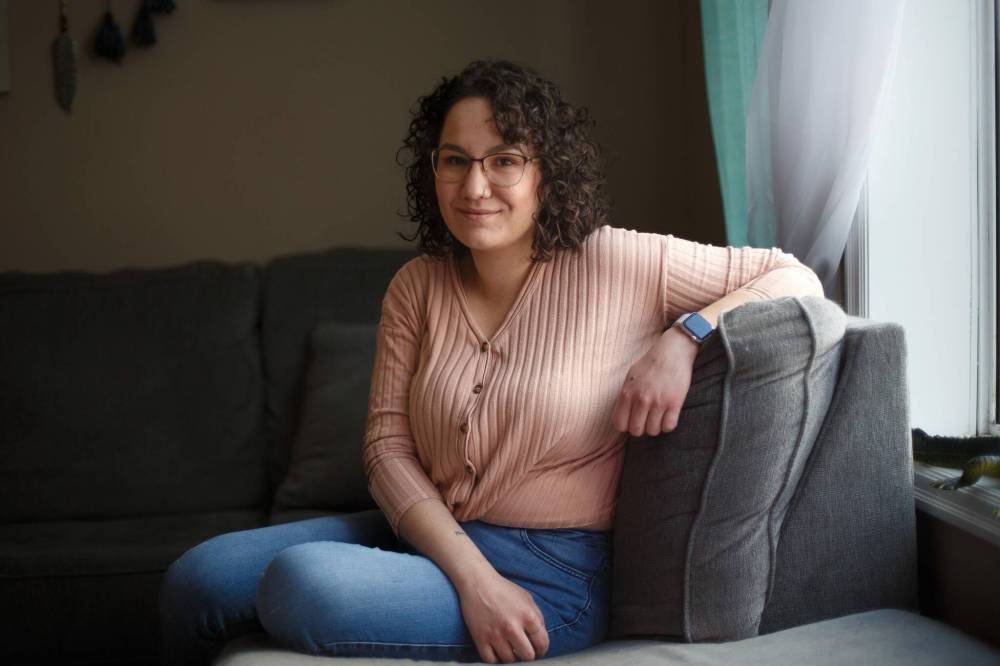
While Paige’s jokes are shaped in the traditional structure of buildup, delivery and punchline, her set often involves a lot of storytelling.
“Indigenous comedy is kind of chatty,” she explains. “There is very much a sense of community in the show. And while my comedy isn’t always about being Indigenous, I find that when I go to an Indigenous open mic, people there get what you are saying and they find it funny as well.”
Jeff Gobeil, who performed at the inaugural Bannock Bums night, says Indigenous comedians often include stories about their family and personal lives in the set. Every joke Gobeil has written has evolved from a story in his life and his jokes often take the form of rants or even faux land acknowledgements.
“The small things that irk people, that get blown out of proportion, are always fun,” he says. “To give an example, as an Indigenous man, and the only Indigenous person in a group of eight presenters, being asked to do a land acknowledgement.
“Or expecting a ‘Hollywood’ spirit name, like Buffalo Hunter Man, and being named Golden Baby Bear, those are things I find funny.”
Sherry Mckay is also relatively new to the live comedy scene, although keen TikTok fans may recognize her name from the social media app, where she posts her humorous takes on life as an Indigenous woman.
The content creator made her standup debut at last year’s Winnipeg Comedy Festival, where she performed as part of IndigE-girl Comedy, a network of Indigenous female comedians across Canada. She says while Indigenous humour can be similar, sometimes there are jokes that don’t translate as well.
“We are not a monolith; there is so much we find that is funny, but culturally, there are things that are different, so you have to find something in your comedy that can speak to the community in front of you.”
Mckay, who will be performing in the upcoming Bannock Bums Auntie edition on May 21, strongly believes in the healing power of comedy. For her, humour is a way to engage people from across the board.
“It’s medicine. It soothes the spirit. It’s very healing for our people. A lot of time there are a lot of tragic things that happen to communities, but for that moment, that one evening, people get to laugh and let loose. And that is really important.”
Mckay says she often pokes fun at herself. And while she is able to make light of almost anything, there are some lines she won’t cross.
“It’s medicine. It soothes the spirit. It’s very healing for our people. A lot of time there are a lot of tragic things that happen to communities, but for that moment, that one evening, people get to laugh and let loose. And that is really important.”–Sherrry Mckay
“I wouldn’t joke about residential schools. I wouldn’t joke about missing and murdered women,” she says. “Comedy is supposed to be a punch-up, not a punch-down. We have to lead by example.
“And even if we have dark jokes within our small circle, black humour to deal with things, if we openly express this, then we would be giving permission to non-Indigenous people to make these jokes. And that is not acceptable because then it becomes racist.”
All three comedians agree while the increase in interest is heartening, it’s important to have the distinction between Indigenous and non-Indigenous comedy, at least for the time being.
“In reality, Indigenous people are still facing discrimination in everyday life and I think it’s important to uplift and highlight Indigenous comedians,” Paige says.
“There are many eyes on the Indigenous community right now,” Gobeil adds. “Indigenous comedy, rooted in laughter and healing, it’s fun to see. Humanizing even. I think comedy can, on some level, bridge the divisiveness.
“As for the interest, if treated properly, I believe it can be a very powerful and important time in our history,” he says. “At the very least, it’s an amazing time for comedy in the Indigenous section.”
— AV Kitching
THE NEWBIES
It’s a Tuesday night in Winnipeg and a crowd of 50 or so people have gathered at a local taproom to hear some jokes. There’s expectation brewing on both sides of the makeshift stage — that the comedians are going to deliver and that the audience is going to respond in kind.
For Jaydin Pommer, those anxious moments right before stepping into the spotlight are the absolute worst.
“Oh, it feels awful. I hate it,” says the host and producer of the Kilter Comedii show. Yet, she persists. “But it’s so much fun once I get up there and get that first laugh.”
JOHN WOODS / WINNIPEG FREE PRESS In addition to running Kilter Comedii (at Kilter Brewery, where she works), Jaydin Pommer heads the monthly women and non-binary open mic at Wee Johnny’s.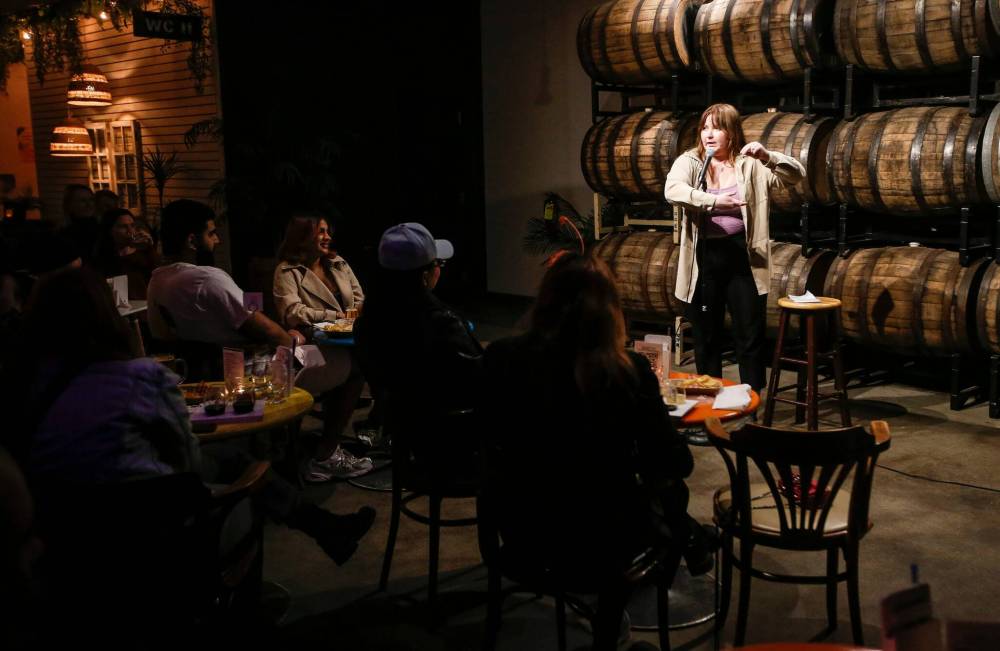
Pommer, 25, was never interested in standup. Improv was her comfy place and Family Dinner, a sketch comedy troupe she co-founded with friends, satisfied her passion for performing.
Despite almost “pissing herself” on the way to her first open mic, Pommer has leaned into the genre over the last number of years and has become part of a large cohort of up-and-coming comedians who are helping expand the local standup scene.
In addition to running regular shows at Kilter Brewing (where she also works), Pommer has taken over the monthly women and non-binary open mic at Wee Johnny’s — an event founded by comedian Dana Smith, who recently moved to Toronto with husband and collaborator Tim Gray. It’s a venture Pommer’s keen to carry on.
“It’s a safer place to explore different genres of jokes you might not necessarily talk about if you’re on an open mic that’s predominantly cis white men,” she says, adding that comedy in Winnipeg and in general remains dominated by that particular group. “But women are definitely creating more spaces for themselves and thriving in those spaces.”
JOHN WOODS / WINNIPEG FREE PRESS Stage fright? ‘Oh, it feels awful. I hate it,’ says Jaydin Pommer. ‘But it’s so much fun once I get up there and get that first laugh.’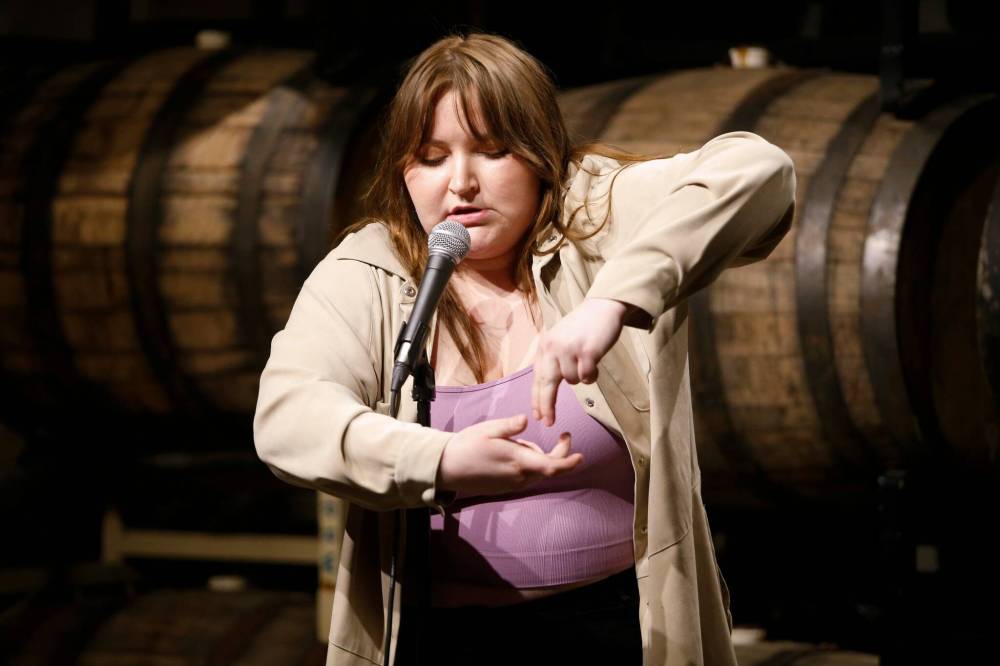
Her goal as a producer is to improve representation as much as she can. “If you don’t even have one woman on the show, what the hell are you doing?”
After warming up the crowd with some self-deprecating jokes about spin class camel toes and eating Hickory Sticks in public, Pommer passes the mic.
Danielle Kayahara is visibly nervous. Her voice is wobbling and her left eye is twitching.
“It’s not you, it’s me,” she tells the crowd. “OK, it’s partly you.”
Although Kayahara, 38, describes herself as “nervous by nature,” the chance to make people laugh continues to trump her anxiety. By addressing it onstage, it has also become a form of outreach.
“That’s kind of my hope,” she says. “That somebody looks at me and goes, ‘If that nervous wreck can do it, so can I.’”
As a half-Japanese queer female comic, visibility is a motivating factor. Kayahara started doing standup in 2017 after taking a workshop for female comedians — a formative experience that allowed her to see herself onstage for the first time.
“I don’t know that I ever would have ventured in without… seeing ladies on stage and, like, a handful of diverse comedians.”–Danielle Kayahara
“I don’t know that I ever would have ventured in without… seeing ladies on stage and, like, a handful of diverse comedians,” she says.
Kayahara gravitates to shows that cater to BIPOC and LGBTTQ+ communities. While there’s been a groundswell of new comedy events and venues in the wake of the pandemic, she’d like to see a wider diversity of comedians behind the mic — something she believes can be achieved by avoiding punch-downs, and empowering audiences and performers of all stripes to participate.
“There can be a certain fear around being called out at a comedy show for whatever makes you different,” she says. “It feels unfair… because we should all be able to laugh.”
Emmanuel Lomuro wants to know who stole his scooter. The second of six comedians on the Kilter Comedii bill, he pokes fun at Winnipeg’s reputation as a hotbed of two-wheeled vehicle theft and riffs on his Sudanese heritage.
Personal storytelling is his way of connecting with audiences and tackling sensitive subject matter.
“Being a Black man in Canada, I talk about race often,” he says. “Sure, you can be offended by it, but at the end of the day, this is something that actually happened to me.”
JOHN WOODS / WINNIPEG FREE PRESS Emmanuel Lomuro, here at Kilter Comedii, uses personal storytelling to connect with audiences and tackle sensitive subject matter.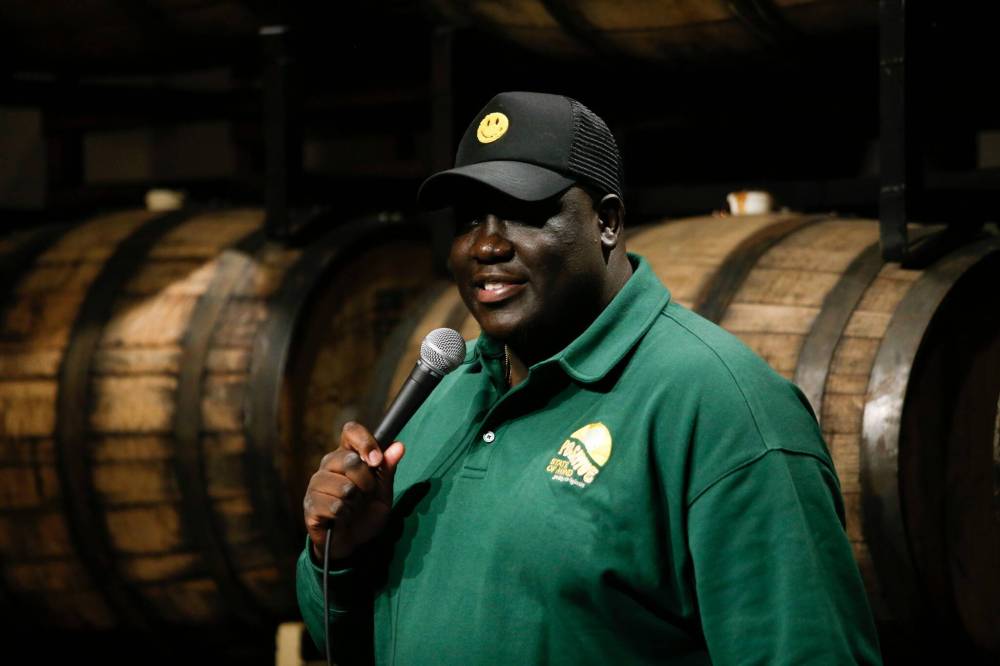
Lomuro, 29, did his first open mic in February 2020 and has had something of a meteoric rise locally. He currently holds the coveted title of Winnipeg’s Funniest Person with a Day Job and has built a wide following through humorous social media posts and persistence. He writes new material every day and performs as much as possible.
“We’re the only profession where the performance is also the practice,” Lumoro says, adding that with so many new comedy venues, he’s able to get on stage upwards of five times a week.
Lomuro has lofty goals — not only for his career, but also for Winnipeg’s comedy scene.
“Traditionally, people would get a little bit of steam and then take off to a bigger city,” he says. “But I know for myself and some of the other local comics, there’s been kind of a change where we want to make this place a destination.
“There’s so much talent here, why do we always have to leave? Let them come to us.”
— Eva Wasney
THE VETERANS
Standup comedy is often described as a young person’s game, but Winnipeg joke-tellers in their 50s and 60s have found microphones remain on when they take the stage in the city’s bustling comedy scene.
Among those is Rollin Penner, who wrote comedy for CBC Radio from 2000 to ’07 and was the voice behind The View From Greenfield.
He made his first foray into the standup world only five years ago to see if his storytelling style worked without a radio antenna.
“In my experience in media over the years, I knew I could make people laugh,” says Penner, 64, who is a sign installer during the day and has worked on Bombers great Joe Poplawski’s Ring of Honour display at IG Field, as well as others pointing to the football stadium’s bathrooms.
“But how do I navigate the standup world? How do I get gigs?”
JESSICA LEE / WINNIPEG FREE PRESS With age wisdom: ‘I listened to the young comedians, and what they were doing, and I’d find out what works, and what doesn’t,’ says Rollin Penner, 64, at the Silver Heights.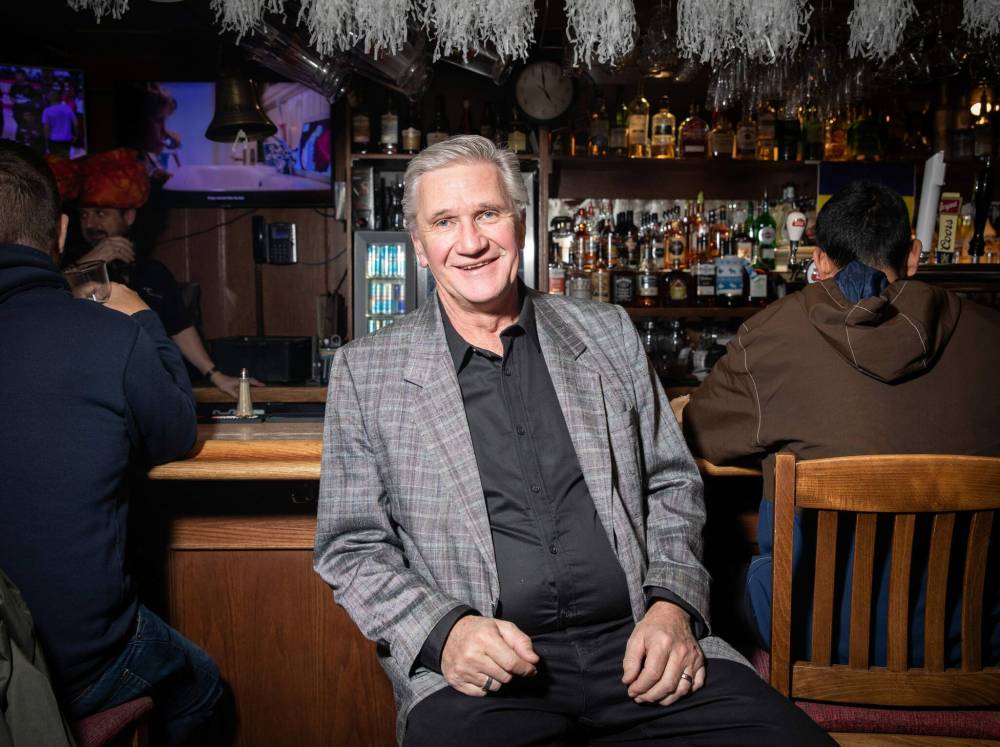
Penner began with open-mic events, and soon realized he would follow comedians who are his kids’ age.
He learned the young shall lead him.
“I listened to the young comedians, and what they were doing, and I’d find out what works, and what doesn’t,” he says.
Penner’s jokes have caught on and led to gigs across the city, including at the new Yuk Yuk’s location at the Fort Garry Hotel, where he had the honour of being the first comedian to take the stage when it opened in February.
Brenda Graham, 55, started her standup career eight years ago at a comedy-writing workshop.
The final day of the workshop included a small show where the class took turns telling the jokes they’d penned; Graham remembers the fear and the thrill of her first performance.
“When I was waiting for my turn, I was so nervous I thought I was going to throw up, but as soon as I started talking into the mic, all of that went away.”–Brenda Graham
“When I was waiting for my turn, I was so nervous I thought I was going to throw up, but as soon as I started talking into the mic, all of that went away,” she says.
Open-mic events were an eye-opener for Graham, who is a group-home support worker and cares for her parents when not on stage.
“I have noticed I tend to be one of the oldest people there,” she says. “Sometimes, what you have is a bunch of young guys who want to see how many F-bombs they can drop in five minutes… so I made it a point to not swear on stage. I found my own niche.”
Jon Ljungberg, 60, who has been telling jokes in Winnipeg for about 30 years, says the city’s comedy scene is more vibrant than ever and gives opportunities for comedians from a variety of backgrounds, even veterans like himself.
“The old guys are getting dusted off and we’re back out there,” says Ljungberg, a former host of Breakfast Television on CityTV who now works at Harvest Manitoba. “Material changes. Now it’s grandchildren, divorce and marriage, stuff that relates to people in their 40s and 50s. They’re not laughing at you, they’re laughing at themselves.”
“Material changes. Now it’s grandchildren, divorce and marriage, stuff that relates to people in their 40s and 50s. They’re not laughing at you, they’re laughing at themselves.”–Jon Ljungberg
He recently found he’d have to adjust his sexagenarian schedule to fit in an 11 p.m. headlining gig at Silver Heights Restaurant.
“Eleven! I’m in my robe at 8, watching my murder shows,” he says with a laugh.
Another of the newer comedy spots in the city is the Limelight in St. Vital’s Riverside, where Veronica Gingles debuts Hey Boomer on Sunday night at 8 p.m., an evening that includes Penner, Ljungberg and Graham.
Gingles, 59, hosts Queerly Beloved, a celebration of queer comedy, regularly at the Limelight, but when the Winnipeg Comedy Festival picked the show up for its May 7 finale at the Gas Station Arts Centre, she found room for the Hey Boomer idea.
Angie St. Mars is also in the lineup, and Gingles expects the millennial comedian to poke some generational fun at her elders.
“Someone has to remind us when to take our meds.”
— Alan Small
COMEDY EN FRANÇAIS
Sometimes, if you can’t find what you’re looking for — be it a community or an opportunity — you have to create it yourself.
When Franco-Canadian comedian, multidisciplinary artist and fringe festival darling Stéphanie Morin-Robert and her family relocated to Winnipeg a few years ago, the move dovetailed with a growing desire to create work in French.
Having two young children reignited her passion for the language, as did translating her acclaimed comedy Blindside — which recounts her experience with childhood cancer and the loss of her eye — into French after performing it some 700 times in English.
But when it came to honing her standup comedy skills in French, she struggled to find opportunities to perform en français — especially as a francophone outside Quebec.
And so, she rolled up her sleeves. Next week, Morin-Robert will be hosting Rire en Français at the Winnipeg Comedy Festival. The show, which will be at the Centre culturel franco-manitobain on May 3, marks a welcome return to French programming for the annual event.
“Francophone Canadians outside of Quebec are very rare as comedians, and if there are some, they usually relocate to Quebec because there are so little opportunities to actually develop that as a muscle,” she says. “So this is a way to reach out to them.”
“It’s been really exciting to see (anglophone comics). Because French is not easy. And standup is not easy. So, to come and do standup in French, when it’s not your mother tongue, is not for the faint of heart.”–Micheline Marchildon
Franco-Manitoban comedian Micheline Marchildon — who will be performing at Rire en Français alongside Martin Bruyère, Rachelle Elie, Michel Roy, Derek Seguin and JC Surette — is a multi-hyphenate veteran of the francophone comedy scene as a standup, screen and voice actor, and TV host.
“I initially moved to Toronto because I secretly wanted to be a comedian in English, having grown up with so much American television,” says Marchildon, who is based in Winnipeg. “French is my first language and I love French. I just thought I’d probably be funnier in English.”
But when she started talking about her experience as a francophone outside Quebec or, as she calls it, an F.H.Q. (francophone hors Québec), she says, “I started realizing how rich that is, because we have this whole persona that is not Québécois. We’re French-Canadian, but we’re not Quebecers.”
In fact, Marchildon has since created a 45-minute solo show called French’er hors Québec (F.H.Q), a self-deprecating work exploring inferiority complexes, linguistic insecurities and francophone identity.
“And the battle to keep transmitting our culture and our language to the next generation, and how we have all sorts of organizations and clubs and things to keep our culture alive,” Marchildon says.
Like Morin-Robert, Marchildon believes in community-building. Five years ago, she and fellow Rire en Français performer Bruyère co-founded Le Rire Zone (“Like, the ‘Rear’ Zone — insert joke here. I’m so sorry, I can’t help but make my bilingual puns”) at CCFM.
Marcel Druwé photo Micheline Marchildon: ‘Transmitting our culture’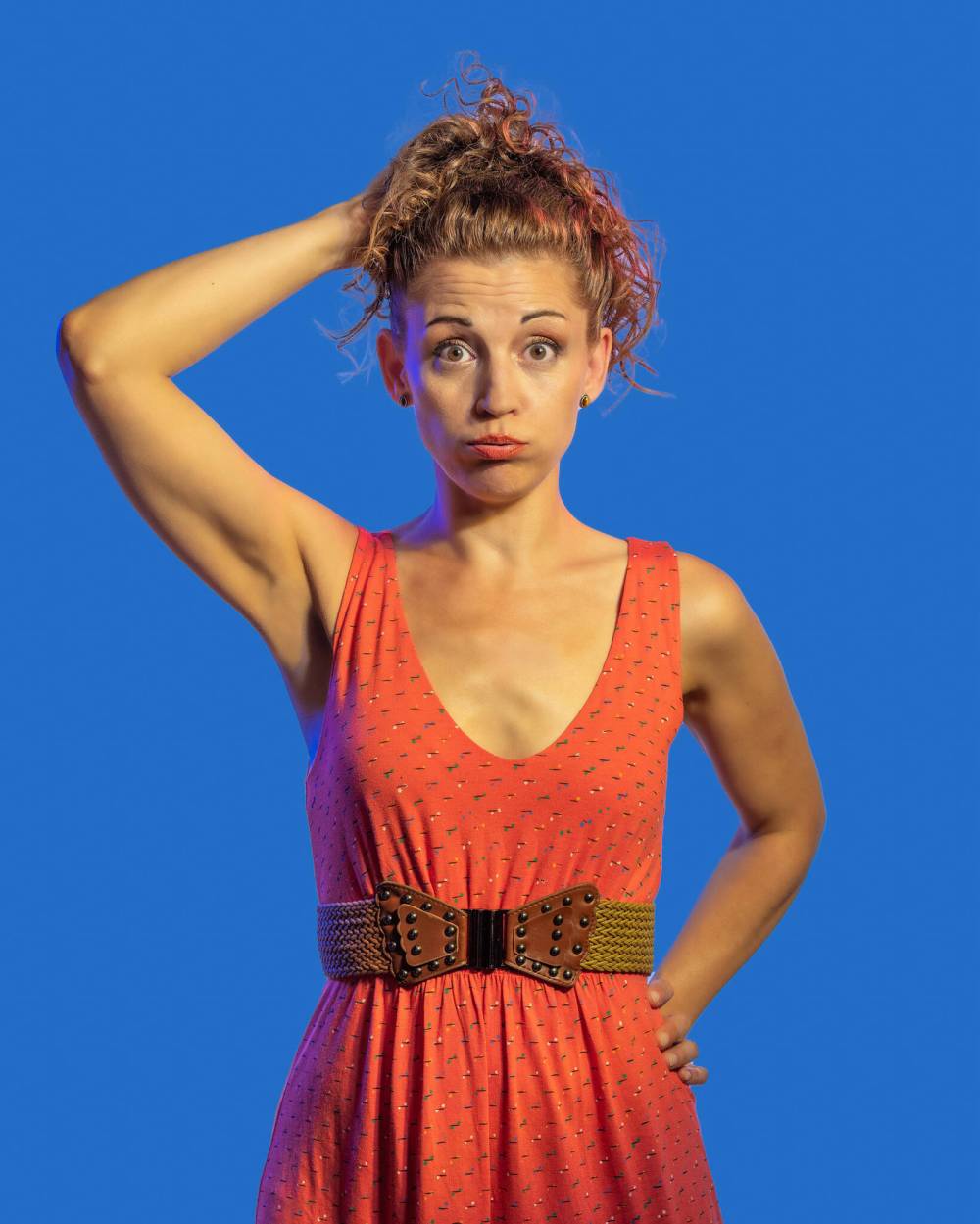
Le Rire Zone hosts comedy nights and open mics dedicated to emerging and established francophone comedians. Marchildon has also relished seeing anglophone comics who grew up in the French-immersion system doing their sets en français.
“It’s been really exciting to see. Because French is not easy. And standup is not easy. So, to come and do standup in French, when it’s not your mother tongue, is not for the faint of heart.”
Having regular opportunities to get up in front of a crowd and just try things out is invaluable.
“The only way you can get funnier is by just doing it over and over and over and over again,” Marchildon says. “You need those nights where you bomb or the joke doesn’t work, so that you get to figure out how it works.”
Without those opportunities, it’s much harder to compete, Morin-Robert says — especially with anglophone comedians who could do comedy every night of the week if they wanted to.
“So, to nurture the minority speaking francophones outside of Quebec and having professional experiences for them is important.”
— Jen Zoratti



Alan Small
Reporter
Alan Small was a journalist at the Free Press for more than 22 years in a variety of roles, the last being a reporter in the Arts and Life section.

Eva Wasney is an award-winning journalist who approaches every story with curiosity and care.

Jen Zoratti is a Winnipeg Free Press columnist and feature writer, working in the Arts & Life department.
Our newsroom depends on a growing audience of readers to power our journalism. If you are not a paid reader, please consider becoming a subscriber.
Our newsroom depends on its audience of readers to power our journalism. Thank you for your support.
History
Updated on Saturday, April 29, 2023 9:10 AM CDT: Fixes typo
Updated on Monday, May 1, 2023 8:55 AM CDT: Changes web headline
Updated on Monday, May 1, 2023 4:49 PM CDT: Fixes name spelling of Micheline Marchildon









